The 46th edition of the Wine Rally - a popular institution of wine bloggers - took me from the Bordelais directly to Switzerland or vice versa. The theme is not quite common, but it concerns everyday life. "Bread and butter wines". This refers to those wines that "are on the table every day and secure the income of the winemaker - but at the same time are products of impeccable craftsmanship". You rarely talk about such wines, you just drink them.
"So what's your favorite wine?" is a question I get asked all the time. I really can't answer it. There are noble drops, small wines, new experiences, many wine regions... I don't know an even wine everyday. Only the almost certain fact that I drink wine every day.
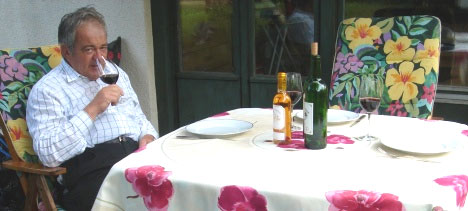
|
| Summer everyday life. Wine accompanies every meal. |
Now the young doctor's assistant has impressed upon me: "Don't drink a drop of alcohol for two days before the test!" She sees my slightly puzzled expression; a topic of conversation - away from the doctor's office groove - develops. "Do you know the 'Riedener Tröpfli'?" No - don't know it, although it's supposed to be from my area. "My father only drinks this wine now, he has removed all other wines from the cellar." Whether he has drunk them, given them away or even emptied them, I dare not ask. But all of a sudden I realize: In many - probably in most - households there is something like a "house wine". The term "everyday wine" usually falls short, favorite wine may be subjectively correct, but there is usually no possibility of comparison. You usually only drink one wine, your favourite wine.
Inevitably, I ask myself the question: What was it like in earlier years? When wine for me was still what this rally was all about: "a wine that can also be on the table every day".
I have to think back a few years, to my first wine of my own in the cellar. A hodgepodge of what wines I knew at the time, adapted to family tradition, to the tight budget of a student or young journalist. A "country wine" crystallized, which I still appreciate today, but which I hardly drink anymore.
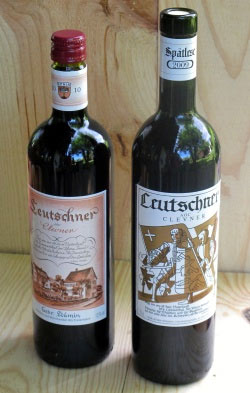
|
| Leutschner% a Pinot Noir from the Lake Zurich region. |
When I think back to this time of my house wine, aromas of dark berries and plums rise up; I seem to remember a slight sweetness, a lot of melting and a velvety finish.
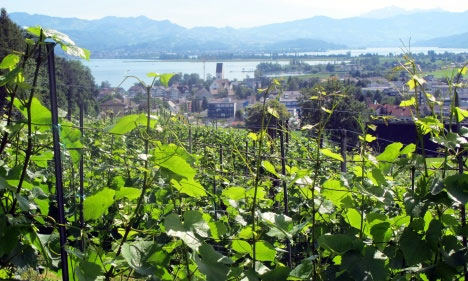
|
| The Leutsch% hamlet above Freienbach on Lake Zurich. |
But then came the great love, something like a "coup de foudre", the incredible infatuation with the distinguished lady Bordeaux. I only realized as the years went by that I had actually fallen in love in an unchaste way, both in terms of the milieu and the demands that were now being made on me. "House wine"-the term was banished from my intercourse with the lady. Now it was noble drops that must be stored for a long time, resting in the cellar for ten years or more; trophies from auctions that were to crown everyday life. A spirit of optimism developed, which despite the difference in status - at that time - was still to be paid for. It wasn't until Dame Bordeaux became rude and arrogant, almost unbearably brash, that the term "everyday wine" came back to me. Admittedly, I no longer depend on it, for my wine cellar has filled up so much in the years of my intimate relationship with said love that it should probably last me - along with my increasingly frequent cheating on other wine beauties - for the rest of my life.
And yet, I have it again, the "everyday wine, which secures the income of the vintner - but at the same time is a product of impeccable craftsmanship, a food in the original sense, a wine that also wants to be drunk" In the meantime, we, me and my everyday wine, have become "worldly". The wine no longer comes from nearby Leutsch, but from the very tip of the Bordelais.
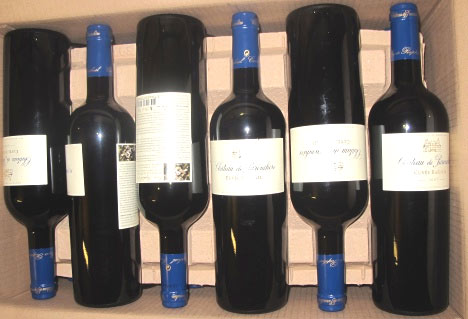
|
| Château Parenchère% Bordeaux. |
It is also no longer "just" five hectares of vineyards from which the wine comes, it is more than 50 hectares. The inconspicuous "white house" in the hamlet of Wilen - today a "preferred residential location" on Lake Zurich - competes with a veritable château in Sainte-Foy Bordeaux, which belonged to Baron Pierre de Parenchère in the 16th century. It belonged in the 16th century to Baron Pierre de Parenchère and in the 19th century to a general who took part in the Battle of Waterloo but died on the estate forty-one years later. So class-wise, my house wine has changed quite a bit, from a bourgeois or even peasant milieu to an aristocratic, almost exclusive society. "Parenchère" is its name and it costs about as much as the Leutschner costs today (about 10 euros). Just as Leutschner is a very good Swiss country wine, Parenchère is a very good Bordeaux. A "small" Bordeaux, they say, from a beautiful wine region, which does not have a sounding name, but which can at least show a beautiful château, which, however, hardly any Bordeaux lover has ever visited. The wine that comes from this château has also found its way into my cellar and into my everyday life, it has become my "house wine".
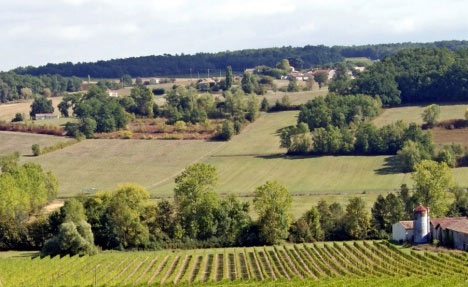
|
| Wine region of Sainte-Foy% Bordeaux. |
A Bordeaux as a "house wine", a case for wine snobs? I think not! Also in Bordeaux there is the "bread and butter business", also in Bordeaux wines have to be sold, which are not immediately driven up by the speculation spiral and disappear from everyday life. Parenchère is such a wine. It has no Parker points, there are hardly any tasting notes, except my own. And those are rare in everyday life: "...dark color, lots of fruit, youthful character, juicy on the palate, hints of mushrooms, peppers, elegant, soft, almost silky." So what, this can be said of many Bordeaux, rightly so. For me, it's just a snapshot of my house wine. Tomorrow it would probably be different impressions. Parenchère is (for me) a wine not to be described, but to be drunk, just a "bread and butter wine".
Sincerely
Yours